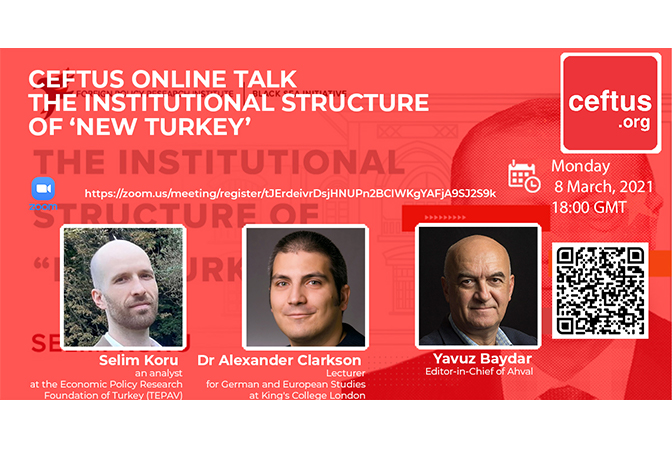
CEFTUS Online talk: “The Institutional Structure of ‘New Turkey’ – with Selim Koru, Alexander Clarkson. Moderator of the panel: Yavuz Baydar
When: Monday, 8 March 2021
18:00 GMT
Turkey transitioned into an ‘executive presidential system’ with a referendum in 2017, and elected Recep Tayyip Erdoğan as its first president through a popular vote in 2018. This was the culmination of various political and bureaucratic forces that characterized the early AK Party governments. As the new system takes root, these dynamics are becoming prevalent in ever-larger parts of the legal and institutional structure of the country.
Which were the groundstones laid on the road to “super-presidential system’? How did the reasonings within the ruling AKP as it shifted towards the notion of ruling through bureaucratic oligarchy? What are the main components of the current ‘order’? This panel will discuss, in detail, Turkey’s new institutional structure and the direction of its evolution.
The event is open to all and to join you must register via the link below
After registering, you will receive a confirmation email containing information about joining the meeting.
*The event is 90 minutes long. The last 40 minutes will be a Q&A session.
Due to limited participation quota in Zoom event, we will be broadcasting our meeting live on Facebook as well.
 Selim Koru is an analyst at the Economic Policy Research Foundation of Turkey (TEPAV) and a Black Sea Fellow at the Foreign Policy Research Institute (FPRI). He writes about political ideas and is currently working on a monograph on the roots of “New Turkey.” Koruholds a BA in History from the University of Wisconsin-Madison, and an MA in international politics and economics from the Johns Hopkins University School of Advances International Studies (SAIS). He has also studied for a year at Boğaziçi University in Istanbul. Koru is currently studying for a PhD in the history of political thought at the University of Nottingham. He divides his time between Ankara and London.
Selim Koru is an analyst at the Economic Policy Research Foundation of Turkey (TEPAV) and a Black Sea Fellow at the Foreign Policy Research Institute (FPRI). He writes about political ideas and is currently working on a monograph on the roots of “New Turkey.” Koruholds a BA in History from the University of Wisconsin-Madison, and an MA in international politics and economics from the Johns Hopkins University School of Advances International Studies (SAIS). He has also studied for a year at Boğaziçi University in Istanbul. Koru is currently studying for a PhD in the history of political thought at the University of Nottingham. He divides his time between Ankara and London.
 Dr Alexander Clarkson is Lecturer for German and European Studies at King’s College London. His research focuses on the politics of diaspora communities in Europe and EU border policy. He is author of ‘Fragmented Fatherland: Immigration and Cold War Conflict in the Federal Republic of Germany’ (2013).’
Dr Alexander Clarkson is Lecturer for German and European Studies at King’s College London. His research focuses on the politics of diaspora communities in Europe and EU border policy. He is author of ‘Fragmented Fatherland: Immigration and Cold War Conflict in the Federal Republic of Germany’ (2013).’
 Yavuz Baydar is the Editor-in-Chief of Ahval – a trilingual, independent online news and podcast site on Turkey.
Yavuz Baydar is the Editor-in-Chief of Ahval – a trilingual, independent online news and podcast site on Turkey.
His opinion articles have appeared in the Guardian, Süddeutsche Zeitung, New York Times, El Pais, Svenska Dagbladet, the Arab Weekly, and Index on Censorship. Baydar was among the co-founders of the independent media monitoring platform, P24. In 2014, as a Shorenstein Fellow at Harvard Kennedy School of Government, he completed an extensive research paper on self-censorship, state oppression and threats over journalism in Turkey – in the wake of Gezi Park protests. Baydar is the author of the book, “Die Hoffnung Stirbt am Bosporus – Wie die Türkei Freiheit und Demokratie Verspielt” (“The Hope dies at Bosporus: How Turkey Squandered Freedom and Democracy”). He was given in 2018 the prestigious ‘ Journalistenpreis’ by the (Munich-based) SüdostEurope Gesellschaft in Germany; and, the Special Award of the European Press Prize ( EPP), for ‘excellence in journalism’, in 2014. Turkey’s first news ombudsman, he served as president of the U.S. based International Organization of News Ombudsmen (ONO) in 2003.